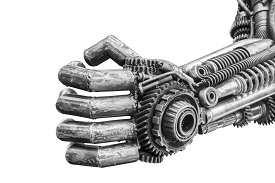 Too often in cases involving stolen property, subrogating carriers do not look any further than the actual thieves for potential subrogation targets. For a variety of reasons, even if they are identified and apprehended, the thieves may not be viable subrogation targets. However, where the sale of the stolen property can be traced, you may also have a claim against the entity that purchases that stolen property even if the purchase was in good faith. In many instances, the buyer of the stolen goods is a much more viable subrogation target than the thief who sells it to them.
Too often in cases involving stolen property, subrogating carriers do not look any further than the actual thieves for potential subrogation targets. For a variety of reasons, even if they are identified and apprehended, the thieves may not be viable subrogation targets. However, where the sale of the stolen property can be traced, you may also have a claim against the entity that purchases that stolen property even if the purchase was in good faith. In many instances, the buyer of the stolen goods is a much more viable subrogation target than the thief who sells it to them.
Pennsylvania, like many other jurisdictions, still recognizes a cause of action for conversion by the rightful owner of stolen property against an entity that has in good faith purchased the stolen property from a third party that stole it. The Pennsylvania courts have held that a good faith purchaser of goods from a converter is also a converter and must answer in damages to the true owner because one who purchases goods from a thief does not acquire the right to those goods over the true owner.
For subrogation purposes, this theory may be particularly useful when dealing with the sale of stolen scrap metal to a scrap yard or recycling facility. This theory effectively makes the purchaser of stolen goods strictly liable to the rightful owner regardless of the reasonableness of their conduct in purchasing the stolen goods. For purposes of a conversion claim, the only thing that a plaintiff must prove to establish liability is that the plaintiff was the rightful owner of the stolen goods and that the defendant purchased those stolen goods.
In 2008, in order to deal with the growing epidemic of the sale of stolen scrap metal and attempt to deter potential scrap metal thieves, Pennsylvania adopted the Scrap Material Theft Prevention Act. 73 P.S. §1943.3. The Act places specific requirements on purchasers of scrap metal to get certain information from sellers and keep this information on file. The Act also restricts scrap metal processors and recycling facilities from purchasing certain types of metal unless the seller is a commercial enterprise. In the case of commercial enterprises, the Act requires, among other things, a signed authorization from the owner or officer of the commercial enterprise stating that the person delivering the scrap material is designated to receive payment for the scrap metal. Numerous other jurisdictions have adopted similar acts to try to curtail the theft of scrap metal.
In HRANEC v. Metalico Pittsburgh, Inc., 107 A.3d 114 (Pa. Sup. Ct. 2014), the Pennsylvania Superior Court reaffirmed that a good faith purchaser of stolen scrap metal is liable for conversion to the rightful owner for the full value of the stolen property even after passage of the Scrap Material Theft Prevention Act. The case makes clear that the Act does not impact common law conversion claims against good faith purchasers of stolen goods. Even if a good faith purchaser of stolen goods fully complies with the Act, the good faith purchaser would still be liable under a conversion theory. However, the Act does provide a basis for an additional theory of liability. While the Act does not statutorily create a private right of action, a violation of the provisions of the Act by a scrap metal purchaser may constitute negligence per se. This cause of action was specifically addressed by the court in the Metalico case.
In addition to providing an alternative potential theory against purchasers of stolen goods to a common law conversion claim, the record keeping requirements of the Act also make proving a conversion claim much easier. In most instances, the purchasers own records are sufficient to establish a prima facie case that a conversion has occurred.
Of course for a successful subrogation recovery, in addition to proving liability, it is important that the defendant have either assets or insurance coverage to recover from. Conversion is an intentional tort and good faith purchasers of stolen items may not have coverage for this under traditional liability insurance policies. However, many insurance carriers now offer specialty liability insurance coverage to recycling facilities and scrap metal processors which covers them against conversion claims. More sophisticated entities are likely to have this type of coverage in place.
If you find yourself with a case involving stolen scrap metal in a jurisdiction other than Pennsylvania, you should look to see if your jurisdiction recognizes a claim for conversion against good faith purchasers of stolen property and also whether it has a statute that governs the purchase of scrap metal as these may both provide viable avenues for subrogation.





